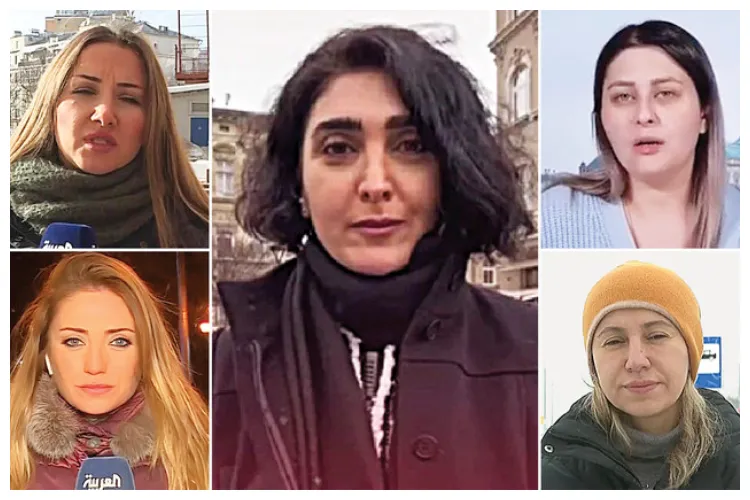New Delhi
Looking from afar, it’s surprising to see that several women reporters from Saudi Arabia, where women were not be seen in public alone till recently, and other Artab countries covering the war between Russia and Ukraine from different locations.
Two Indian TV women reporters Shweta Singh and Shivangi Thakur are also among those risking their lives to keep television watchers back home updated on the situation in Ukraine
Many women from Arab media houses are reporting from the war zone, their focus is mainly on the impact of the war on the region.
Arab news channels - from Riyadh, Dubai to Doha – are giving around-the-clock updates about the news about the crisis.
Curiously, almost all Arab channels have deployed women correspondents to cover the war.
Among the prominent Arab women who covered the war is Najla Abumerhi, a war correspondent for Qatar's regional news channel Al-Arabi TV. Earlier in BBC Arabic, the London-based Abumeri's reporting style was praised. She says, “Reporting from a hostile environment requires journalism, personal aptitude, and skill. They enjoy it, so when I was decided by my editors of Al-Araby TV to be stationed in Kyiv, Ukraine, I immediately accepted the mission."
Abumeri says that her mission is dedicated to Mary Colvin, a female journalist who covered the Syrian war with her. She was then killed while reporting from Syria for the Sunday Times newspaper in London.
"I think we see women journalists on the front lines more than many factors, not because women were less eager before, but because at the decision-making stage, the mindset has changed," says Abumeri.
She said, “Over the past ten years, we have seen an environment that has led to greater diversity in general, which has provided a platform for more women contributors, more presenters, allowing women to reach higher levels of seniority and grow further."
Another woman covering the war is Al-Hadath's Christian Baisari. He recently tracked Russian military movements when Russian troops entered Kharkiv in northeast Ukraine. The footage showed Baisari and his team being asked to take shelter and go somewhere safe.
Another reporter is Katiya Tome of Al-Arabiya News Channel. She has extensive experience in reporting on the Russian taking over Crimea in 2014.
Other women journalists covering the war are Diyla Khalili, reporting from Russia for Ashrak News, and Ranya Dridry of Al-Jazeera. He is stationed on the Russia-Ukraine border to report live from the ground.
"A person and a journalist should be protected regardless of how they identify themselves," Anbumerhi told Arab News.
"Safety measures begin with taking the necessary steps to make the journalist mission-ready and well equipped, and provide them with the knowledge and information they need to make a proper assessment for their safety," she said.
Arab women's correspondents follow closely the reporters who report from conflict zones.
Atwar Bahjat, an Iraqi journalist from al-Arabiya, lost his life while reporting on the US invasion of Iraq. In 2006, while covering a story in Samara, he was attacked and deliberately murdered, along with his associates Adnan al-Dulaimi and Khalid al-Falahi.
Other well-known conflict correspondents are Al Arabiya's Reema Maktabi and Najwa Qassem, who covered the 2006 Lebanon War, with the former named among the 100 most influential journalists in the world in a ranking by a UK-based charity covering armed violence

